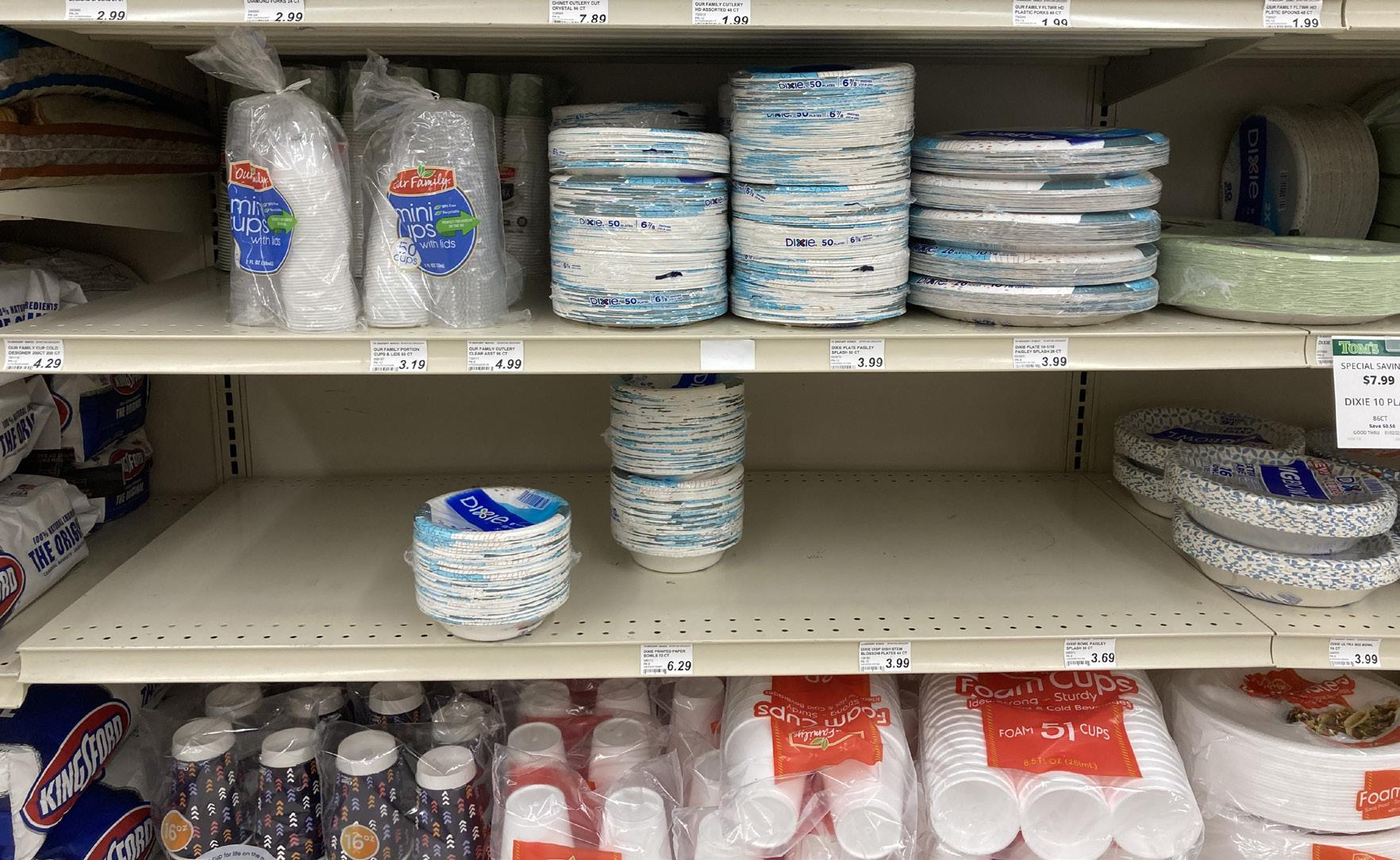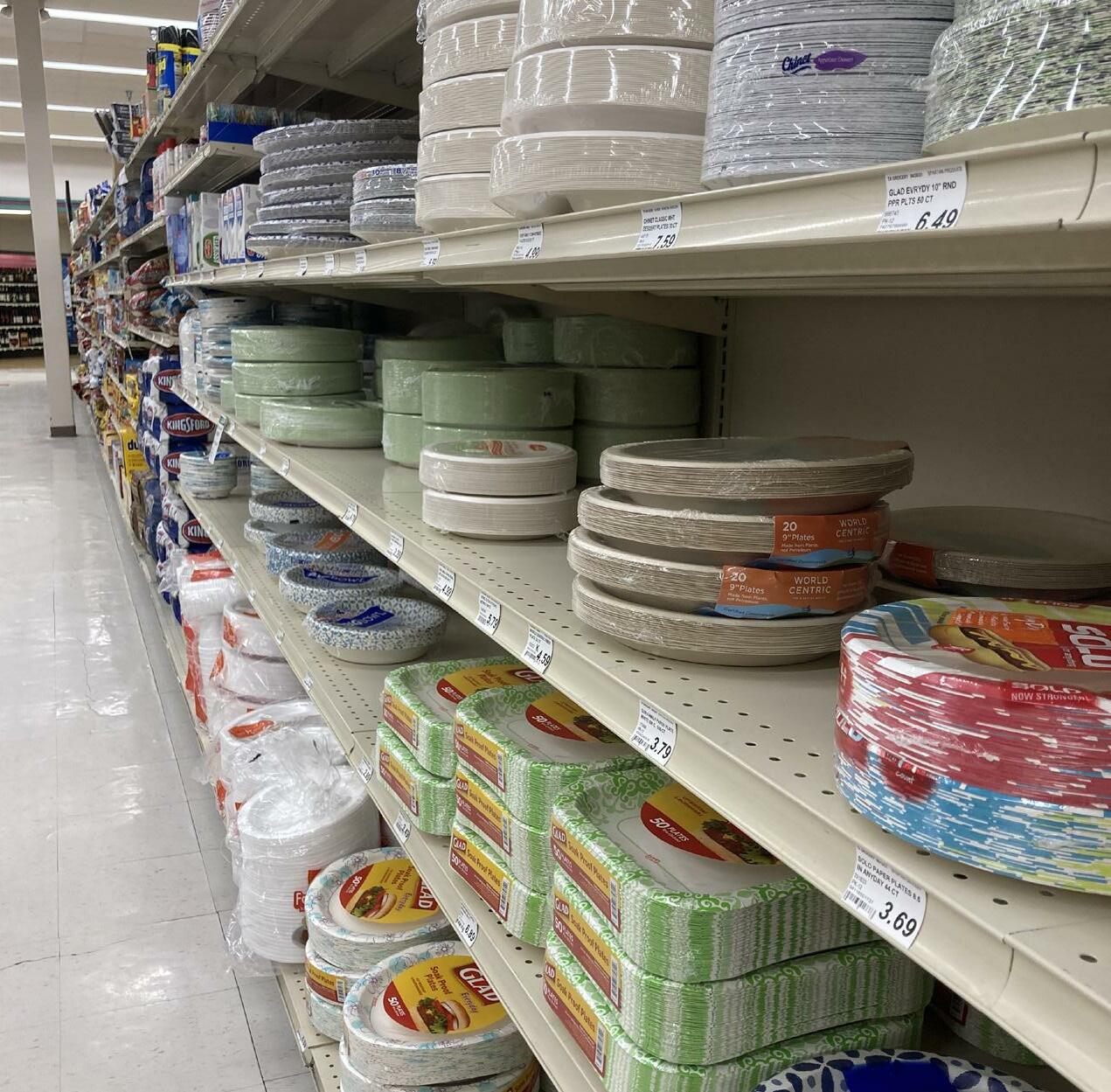
4 minute read
The Price We All Pay
Photos: E. Hermel
by Kristen May staff writer
The Price We All Pay Supply chain shortages have impacted everyone in Traverse City, whether it be consumers, employees, or business owners.
icture yourself walking into Costco on a Sunday. You’re looking for paper towels, but when you round the corner the shelves are empty. Supply chain shortages have spiraled out of control since the pandemic began. Products of a wide variety have become unavailable to consumers, ranging from meat to hand sanitizer to toilet paper and beyond. Too many items have been cleared off the shelves and aren’t being restocked immediately. The supply chain issues impacting Traverse City are making products inaccessible, which in turn affects businesses that depend on them. Consumers rely upon these businesses to have products that they need, and when they don’t, people are more likely to change the places they shop in order to collect items that were once widely available. The root of the problems in Traverse City extends all the way to the Atlantic Ocean. For months, shipping ports have been cluttered by freighters lined up for miles waiting for a chance to unload. The ports are too backed up to accommodate all of the supply surges, leaving the containers with nowhere to go. The shortages are hitting hard nationwide, but Traverse City is having issues locally. Consumers have had to adjust their day to day lives in order to accommodate
Pthe shortages. Items have become limited, forcing people to purchase less. “Meijer has limits on almost everything on their shelves. It was either limit two or limit four,” local realtor Nan Ray states. Limiting the amount of products that a customer can buy is making it difficult for consumers to obtain exactly what they need. Large families especially struggle with the limits on products because the items that they can obtain aren’t enough to feed everyone. It doesn’t help that consumers are increasing their demand. Customers are wanting to stock up on certain items in case the pandemic takes a turn for the worse or the shortages get bad. Try to remember the first time you heard or read about the toilet paper shortages. Did you panic? Did you try to get your hands on as many rolls of toilet paper that you could? If so, you contributed to the shortages and now we’re all having to pay the price. In an interview with Insider Magazine, Jonathan Gold, vice president of supply chain policy at the National Retail Federation, remarks that “demand grew so rapidly in the past two years that it’s equivalent to about 50 million new Americans joining the economy.” Small businesses in Traverse City have had to adapt, due to the obstacles the shortages have

thrown at them. Heather Bailey, a manager at the Grand Traverse Pie Company, finds that “we just have to find supplies through other distributors or another item that is similar compared to the food item that we are missing.” Businesses are feeling the strain and pressure as the holiday season nears as well. Since products are becoming unavailable, businesses aren’t able to find some necessary supplies that are needed in their store. Bailey notices that some ingredients for their holiday pies are becoming more scarce. “Right now, as of yesterday, the main part of the pumpkin pie I can’t get, so, that’s stressing out my bakers,” Bailey explains. Everyone in a business is being negatively impacted by the shortages because every single person is vital to the business being successful. While some stores are struggling to get products or are having a difficult time attracting customers, others are seeing an uptake in business. Kylie Pickle ‘22, an employee at Big Lots, notices that they’re getting more customers as the shortages continue. “There are some people coming in who talk about how they can’t find this and that in other stores when you would normally be able to walk into a Meijer and find it right away,” Pickle explains. “I think one of the items was Fiji Water. I had one guy come in and buy almost an entire shelf of Fiji Water because he couldn’t find it anywhere else in town.” Although a store like Big Lots is benefiting from these current changes, they’ve still had to adjust to adapt to the shortages. Workers themselves are in high demand right now because some employees are choosing not to return to work after the height of the pandemic for varying reasons: illness, having to care for a loved one, or just not feeling safe enough to be at their job. Many businesses are craving more help and are constantly waving ‘We’re hiring’ flags, but they’re still having issues getting the assistance they need. According to CNBC, “there were 10.4 million job openings in August whereas the number of people leaving their jobs (the so-called “quits rate”) rose to 4.3 million, the highest level seen on records dating back to Dec. 2000.” Jobs everywhere in Traverse City are being affected by the supply chain issues. Nan Ray is a realtor and finds that it’s getting harder and harder to have items delivered on time due to the shortages. During a home remodel earlier this year, Ray found that two items were severely delayed because of the shortages. “We had two major things that were really slow. The first was our bathroom countertops and those were about three months late. The second thing was we ordered was a couch in February, knowing that they were taking a little bit longer, and it was July [before] it came,” she states. Since businesses are backed up, they don’t have the products that their customers need, which then impacts the customer’s job and daily life. Regardless, everything trickles down until the very last person feels an impact. //










